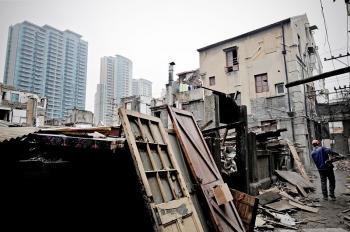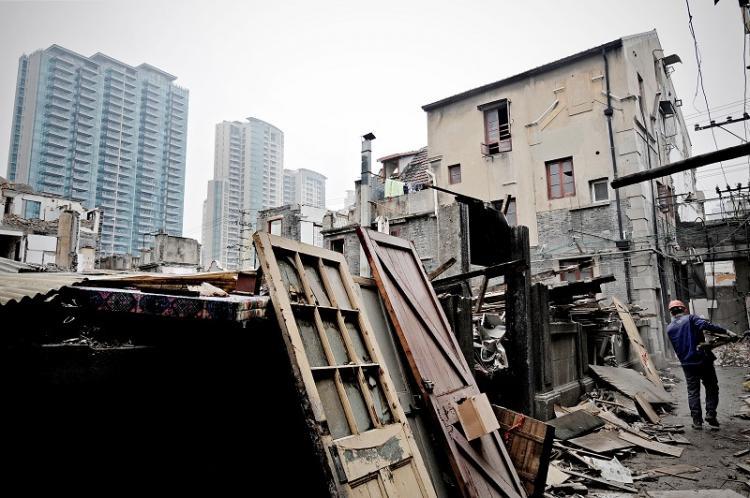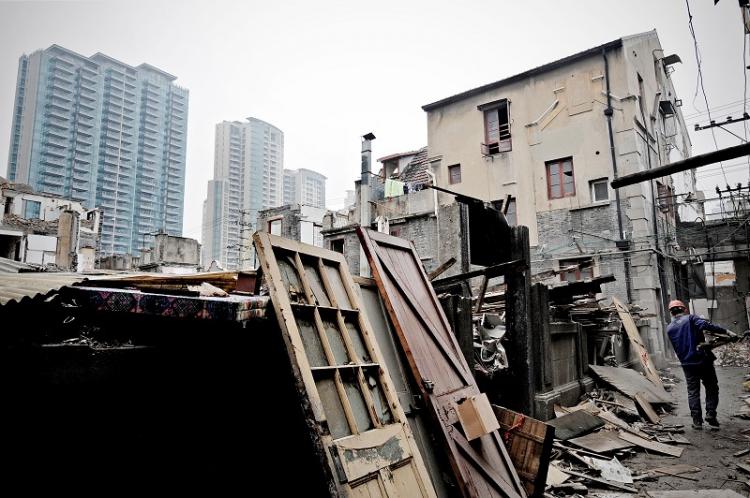“Profits gained from property transactions are reaped by governments, not developers!” This remark from a Chinese Congress committee member’s speech put the spot light once again on the sensitive issue of skyrocketing real estate prices in China.
Mr. Zhang Li, the vice chairman of Guangzhou R&F Properties, made the statement during a panel discussion on Social Welfare and Public Security as a member of the Chinese People’s Political Consultative Conference (CPPCC) National Committee, according to a Beijing News report.
The CPPCC is a unique political entity in China. A recent Asia Times article described it as “a showcase of the CCP’s work or as some call it, a ‘political vase.’” The article continued, “Its main function is simply to offer proposals and advice to CCP policymakers, who decide whether or not to take it.”
Zhang said that in the past, the cost of land was only 20 percent of the total cost of a house, but now it has risen to 60 percent to 70 percent. “Average profits gained by the government in selling land are now as high as 200 percent,” he said. For example, land that is bought for 1 million yuan (US$146,512) is often sold by the local government to property developers for 3 million yuan (US$439,536).
The high price of real estate during the economic downturn has long been criticized by the Chinese public. Among the many proposals brought up at the new session of the CPPCC, nearly half of them are related to the real estate market.
Besides Zhang, many representatives of the CPPCC from the real estate industry, as well as academics, have likewise blamed the regime for “reaping profits in the overpriced market.”
Zhang Yazhong, a member of the CPPCC, said that local governments play the role of a promoter in the increase in property prices, especially when they regard real estate as a backbone industry as well as an important source of revenue, according to a report on the state-run Web site crn.cn.
Experts also criticized the regime’s 4 trillion yuan (US$586.05 billion) stimulus package as another reason for the housing market speculation.
According to the 2009 China Statistical Bulletin issued by the National Bureau of Statistics, China’s money supply increased 27 percent last year, while its GDP growth is only 8.7 percent.
The BBC Chinese quoted Chinese economist Zhang Wei from Cambridge University: “It has been given to these state-owned enterprises and local regimes under the regime’s 4 trillion yuan-stimulus policy.” He said that the large state-owned enterprises could get bank loans and enter the real estate market one after another.
According to Yu Bin, director general of the Macroeconomic Research Department of the Development Research Center of the State Council, in 2009, the average property price rose US$146 per square meter compared to 2008. This is the highest increase in a year since the implementation of housing reforms.
Currently, even Chinese officials have to admit that the real estate industry in China is full of bubbles, but no one dares to break them.
Well-known current affairs critic Mr. Lin Baohua believes that the regime has no solution for property speculation. He said that although Premier Wen stated his strong determination “to put a stop to this ridiculous increase in certain property prices,” in his government work report, it was only political show—those below were actually singing a different tune.
According to the state-run Xinhua.net, the president of the Beijing Huayuan Group Ren Zhiqiang said: “If property prices fall, then the GDP will also fall, and this will make Premier Wen even more anxious than the property developers.”
Mr. Lin added, “Since the Chinese regime wants to ensure GDP growth of at least 8 percent, it has no choice but to protect the real estate market. Besides, if the real estate bubble bursts, how many bad debts will that create for the banks?” Since this could cause a financial crisis, the banks have to continuously inject funds into the property market to stop the bubble from bursting, he said, and this has led to inflation in new loans.
Mr. Lin also believes the fundamental reason for property speculation is that it has become a means for the rich and influential in China to accumulate wealth.
Read the original Chinese article.
Mr. Zhang Li, the vice chairman of Guangzhou R&F Properties, made the statement during a panel discussion on Social Welfare and Public Security as a member of the Chinese People’s Political Consultative Conference (CPPCC) National Committee, according to a Beijing News report.
The CPPCC is a unique political entity in China. A recent Asia Times article described it as “a showcase of the CCP’s work or as some call it, a ‘political vase.’” The article continued, “Its main function is simply to offer proposals and advice to CCP policymakers, who decide whether or not to take it.”
Zhang said that in the past, the cost of land was only 20 percent of the total cost of a house, but now it has risen to 60 percent to 70 percent. “Average profits gained by the government in selling land are now as high as 200 percent,” he said. For example, land that is bought for 1 million yuan (US$146,512) is often sold by the local government to property developers for 3 million yuan (US$439,536).
The high price of real estate during the economic downturn has long been criticized by the Chinese public. Among the many proposals brought up at the new session of the CPPCC, nearly half of them are related to the real estate market.
Besides Zhang, many representatives of the CPPCC from the real estate industry, as well as academics, have likewise blamed the regime for “reaping profits in the overpriced market.”
Zhang Yazhong, a member of the CPPCC, said that local governments play the role of a promoter in the increase in property prices, especially when they regard real estate as a backbone industry as well as an important source of revenue, according to a report on the state-run Web site crn.cn.
Speculation soaks up stimulus
Experts also criticized the regime’s 4 trillion yuan (US$586.05 billion) stimulus package as another reason for the housing market speculation.
According to the 2009 China Statistical Bulletin issued by the National Bureau of Statistics, China’s money supply increased 27 percent last year, while its GDP growth is only 8.7 percent.
The BBC Chinese quoted Chinese economist Zhang Wei from Cambridge University: “It has been given to these state-owned enterprises and local regimes under the regime’s 4 trillion yuan-stimulus policy.” He said that the large state-owned enterprises could get bank loans and enter the real estate market one after another.
According to Yu Bin, director general of the Macroeconomic Research Department of the Development Research Center of the State Council, in 2009, the average property price rose US$146 per square meter compared to 2008. This is the highest increase in a year since the implementation of housing reforms.
Real Estate Now a Bubble
Currently, even Chinese officials have to admit that the real estate industry in China is full of bubbles, but no one dares to break them.
Well-known current affairs critic Mr. Lin Baohua believes that the regime has no solution for property speculation. He said that although Premier Wen stated his strong determination “to put a stop to this ridiculous increase in certain property prices,” in his government work report, it was only political show—those below were actually singing a different tune.
According to the state-run Xinhua.net, the president of the Beijing Huayuan Group Ren Zhiqiang said: “If property prices fall, then the GDP will also fall, and this will make Premier Wen even more anxious than the property developers.”
Mr. Lin added, “Since the Chinese regime wants to ensure GDP growth of at least 8 percent, it has no choice but to protect the real estate market. Besides, if the real estate bubble bursts, how many bad debts will that create for the banks?” Since this could cause a financial crisis, the banks have to continuously inject funds into the property market to stop the bubble from bursting, he said, and this has led to inflation in new loans.
Mr. Lin also believes the fundamental reason for property speculation is that it has become a means for the rich and influential in China to accumulate wealth.
Read the original Chinese article.





